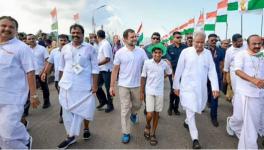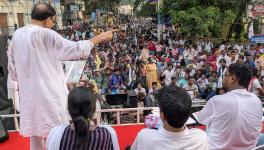Televised Death of a Commentator
Image for representational use only.
After the death of Congress party spokesperson Rajiv Tyagi, discussions about the dignity of debates on TV channels have intensified. Some are blaming BJP spokesperson Sambit Patra, Sangh ideologue Sangeet Ragi and the TV anchor for this sad incident, while others say that the News Broadcasters Association (NBA) must introspect and rectify the root cause for such an incident. Congress spokesperson Jaiveer Shergill has written to Union Information and Broadcasting Minister Prakash Javadekar demanding an advisory to control poisonous and divisive TV debates.
The question arises, is it just bad behaviour and poor mannerisms that plague Indian news TV? Or is there a deeper scheme behind how debates are being framed by channels?
Keep in mind that those “news” items are usually picked for televised debates which directly or indirectly make a case for Hindu-Muslim rivalry. Whenever population control, Pakistan and terrorism are debated, Indian Muslims are drawn into these “debates”. As if to cleanse the audience’s palate, from time to time, news like Sushant Singh Rajput’s suicide are turned into sensational items requiring national and public attention. This type of news kills several birds with one stone. It grabs public attention while discreetly serving the political and corporate agenda. Some channels are downright poisonous even in how they report ordinary but important occurrences, such as the anti-CAA-NRC agitation and the Tablighi Jamaat episode.
TV was no angel before 2014, but the on-screen language was never this crass. Discussions now begin and end with expletives and personal attacks. Not only this, some “special” Muslims are brought to the TV studios, and in a language and tone that appears clearly scripted, they go all out to offend Hindu viewers and co-debaters. As if on cue, a BJP spokesperson or political analyst then tears into these TV studio Muslims and starts lashing out at all Muslims, even the Quran or Sharia. Typically, the so-called Muslim scholars remains silent while this happens. In this way, sometimes these alleged scholars achieve what a BJP spokesperson is unable to.
If any Opposition party spokesperson tries to speak, his volume is lowered or they are interrupted mid-sentence. Often a BJP spokesperson will command an anchor to stop their rival from being heard. Patra and Gaurav Bhatia often insist that anchors mute or interrupt their opponents in debates. If an Opposition spokesperson does make a strong argument or raises a serious question, it is usually just before the anchor decides it is time for a commercial break. Interestingly, there are around 8–10 Muslim faces who have been appearing on different channels for several years as “Muslim scholars” or experts on Muslim affairs. Regardless of how these scholars are at home, whether they pray or not, they are seen on TV in full Maulana attire, taqiyah [prayer hat] and all.
If a debate has sensational value, it is repeated several times a night by the channel. The footage is also placed on the channel website and circulated on social media so that it reaches more and more people—regardless of its actual value. The aim is clear—to entangle the general public in unnecessary issues and divert their attention from important and essential issues.
If we look at the history of the last three decades, communal frenzy has always spread concurrently with the assets of the country being sold to capitalists and the enactment of anti-labour laws in the name of economic reform. Not to forget, attempts are also made to create a communally-charged atmosphere depending on electoral needs. Communitarian flames were being fanned even when Narasimha Rao was the prime minister and the economy was being liberalised, when preparations to sell off Public Sector Units were in full swing. The record of the role of the media in 1991 and 1992 still exists. This trend has continued since then. The current government has also prepared a disinvestment list of 23 PSUs including the Indian Railways, Air India and several Navratna companies, including BSNL.
The question arises, what is the connection between poisonous and murderous debates and irrelevant news on TV to the sale of the country’s assets? Most of the country’s media is owned by the same corporate houses which are involved in the loot of the country’s resources. Many TV channels and newspapers are not only owned by the big profitable corporate houses, but they are also the medium of generating a political and social narrative across the country.
Totalitarianism and communalism suits corporate houses. The debates on TV which are heavily slanted in favour of corporates have fostered a narrative among people that governments which work for the social sector and subsidise farmers and the poor are bad. The gains are only for those who wish to capture India’s jal, jangal, zameen (water, forest, land) and exploit them to earn big profits. This is why there is neither much news nor debate on TV about unemployment, corruption, commercialisation of education and health, the recent meddling with environmental impact assessment (EIA) and so on.
At present, the situation is such that no one is going to ask the question, why in this recession that happened during the Covid-19 pandemic, the wealth of only four or five people in the country is increasing? And what will happen to the 15 crore countrymen who have become unemployed? The situation is that people are withdrawing their money from their only secure saving, the EPF, to make ends meet.
The poison that is presently spreading through the country’s finances is mainly due to the greed of the corporate houses and the media is owned by them. Obviously, corporates cannot do this work alone. It is being watered and fed by politics. This can be understood by these recent jumlas: “Do not reward Muslims, do not despise, but refine them”, “It is a person’s clothes that reveal who they are...” and “These are not coincidences but experiments…” Now a couplet from Goswami Tulsidas “Bhayabinuhotnapreeti—no love without fear” being projected as a political weapon.
Tulsidas had written this couplet describing the glory of the Hindu god Rama, while Prime Minister Narendra Modi has probably mentioned it with Pakistan and China in mind. But some BJP spokespersons and TV anchors have associated it with domestic politics and they are trying to put it in practice. The corporate is at an advantage from all this, because unless tribals are afraid, how will their homes in the hills be excavated and their forests harvested?
It is said that when Rajiv Tyagi suffered a heart attack, he was in the midst of an online debate on a TV channel from his home. The discussion was on the Bengaluru violence, which is a law and order issue in a police station area of that city. Both Patra and the TV anchor sarcastically said about Muslims, “If you are not scared then this is the condition, when you become fearless, what will happen...” In other words, they wanted to say that for Muslims the “Bhayabinu hoyi na preeti” policy has to be adopted! This discussion escalated to such an extent that while Tyagi was dying on-screen, the TV anchor was tweeting his dialogue. During the debate, objectionable comments were passed about Tyagi and he was not being allowed to speak. He was a good man, a believing Hindu and an admirer of Mahatma Gandhi. He was called “Jaichand” during this program, and told that no one becomes a Hindu just by wearing a teeka (religious mark) on their forehead; that to be a Hindu the teeka must be on their heart and that has must state “who burnt the house”. Right at this time, he suffered a heart attack and fell from his chair. The last thing he said to his wife before he died was “These people have killed me...”.
The author is an independent journalist. The views are personal.
Get the latest reports & analysis with people's perspective on Protests, movements & deep analytical videos, discussions of the current affairs in your Telegram app. Subscribe to NewsClick's Telegram channel & get Real-Time updates on stories, as they get published on our website.
























